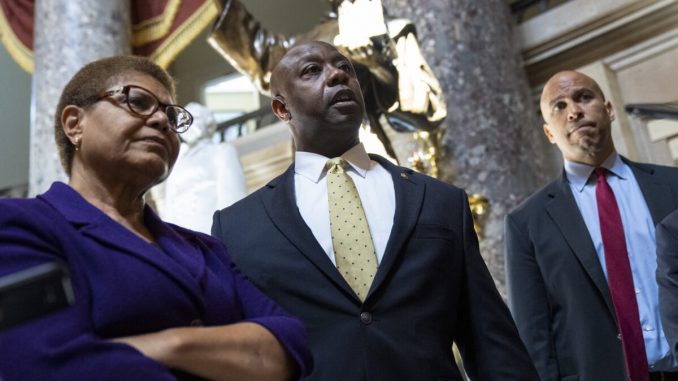

A trio of bipartisan lawmakers leading negotiations on police overhaul measures said Monday that they remain optimistic a compromise deal can be reached.
Sens. Cory Booker (D-N.J.), Tim Scott (R-S.C.), and Rep. Karen Bass (D-Calif.) said in a statement Monday—one day prior to the anniversary of George Floyd’s death—that “while we are still working through our differences on key issues, we continue to make progress toward a compromise and remain optimistic about the prospects of achieving that goal.”
A core part of the issue is the George Floyd Justice in Policing Act of 2021, which passed the House earlier this year but has since stalled in the Senate due to Republican objections, chiefly in regards to provisions reducing qualified immunity for police officers, a doctrine that gives government officials broad protections from lawsuits.
The sweeping bill aims to end qualified immunity, lower the legal standard required to convict an officer for misconduct, establish a national database to track police misconduct, require federal law enforcement officials to use body and dash cameras, restrict the use of chokeholds and carotid holds, and prohibit no-knock warrants in drug cases, among other provisions.
Advocates say the bill is long overdue, with George Floyd family attorney Ben Crump saying in a Monday statement on Twitter: “We must seize THIS moment to pass meaningful federal police reform legislation. Black people should NOT have to die for these reforms! I urge Congress to pass the George Floyd Justice In Policing Act so we can finally have this necessary change in America.”
Critics say the legislation will make policing more difficult, jeopardize officer safety, and drain resources from law enforcement.
Republicans have generally backed a scaled-down measure like the Justice Act introduced last year by Scott. His proposal called for reducing the use of chokeholds, increasing federal reporting requirements for use of force and no-knock warrants, strengthening of training methods and tactics regarding de-escalation, ramping up the use of body cameras, and reforming law enforcement hiring and disciplinary practices to reduce the number of “bad apple” cops in police departments.
“This proposal reinforces the need for better community policing, best practices, and creating more transparency when it comes to reporting encounters with law enforcement throughout the country,” Sen. Lindsey Graham (R-S.C.) said in a statement at the time. “I hope our Democratic colleagues will take this proposal seriously, and that all of us work together to find common ground to bring reform to policing in America.”
But Scott’s measure failed in the Senate last summer, with Democrats lining up to block it after criticizing the legislation as inadequate. The only Democrat lawmakers to give the Justice Act a preliminary green light were Sen. Joe Manchin (D-W.Va.) and then Sen. Doug Jones (D-Ala.), who crossed party lines to vote “yes” on a procedural vote.
In late April, bipartisan negotiations resumed around the George Floyd Justice in Policing Act and police reform efforts more broadly, with Bass, Booker, and Scott leading the way.
President Joe Biden called on lawmakers to pass the Democrat-led police reform measure by May 25—the anniversary of Floyd’s death.
The White House acknowledged last week that lawmakers would be unlikely to adopt a police overhaul bill by that deadline.
“What we’ve seen from the negotiators—and we’ve been in close touch with the negotiators as well—is that they still feel progress is being made,” White House Press Secretary Jen Psaki told reporters at a briefing Friday.
“Yes, it’s unlikely—as they’ve conveyed as well—we’re going to meet the timeline that the president outlined in his speech,” Psaki added.





Be the first to comment